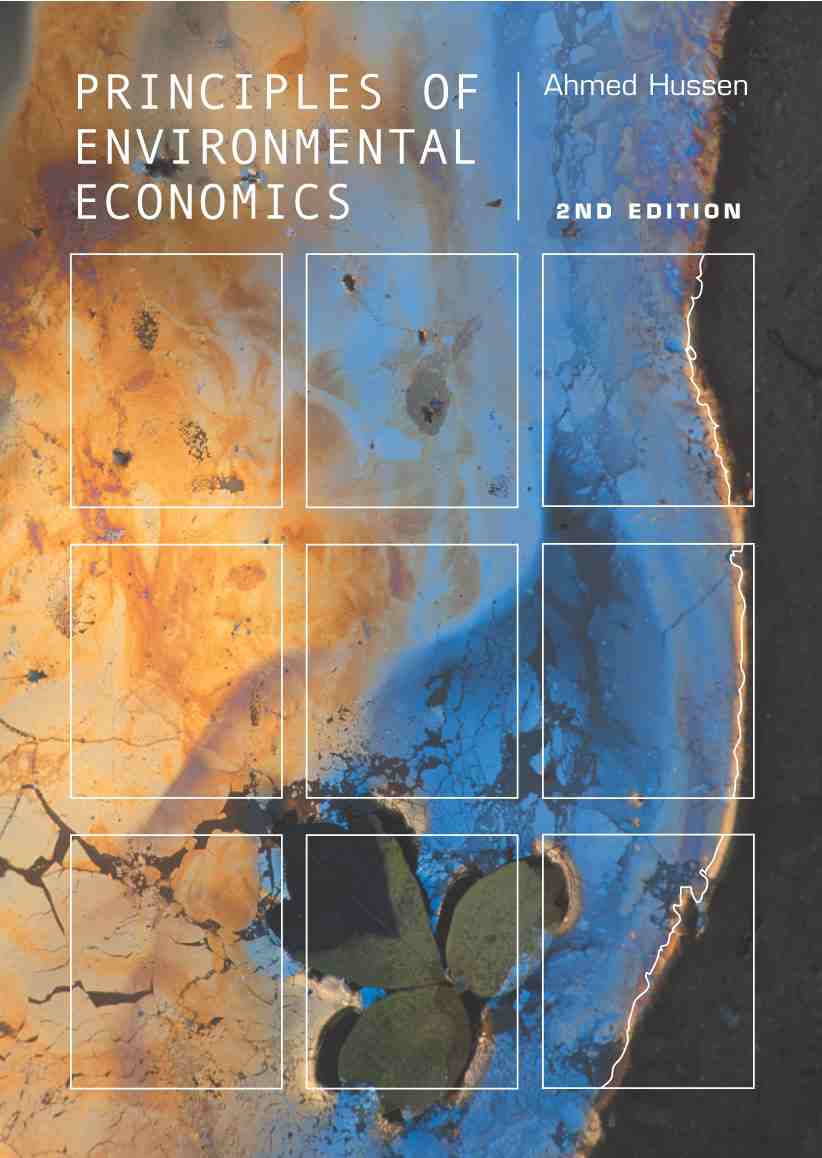Resume
Research and Writing
Contact Information
Home
Courses
Principles Of Environmental Economics 2nd
Edition,
Now Available!
 |
Econ 490: Senior Topics in
Environmental Economics
Syllabus (pdf version)
ECONOMICS 490: SENIOR SEMINAR (Spring 2001)
THE ECONOMIC APPRAISAL OF ENVIRONMENTAL ASSETS:
Valuing Nature
"In a world where money talks, the environment needs value to give it a
voice." (Frances Cairncross, p. 43)
"ÖAlthough ecosystem valuation is certainly difficulty and fraught
with uncertainties, one choice we do not have is whether or not to do
it." (Robert Costanza, et. al. p. 7)
SEMINAR DESCRIPTION:
The primary objective of this seminar is two folds: (1) To
study the methodological and ethical foundations of modern economics
approaches to the valuation of environmental (ecosystem)
services. Typical examples of such undertaking may involve the
assignment of monetary values to: animal species that are
threatened with extinction, such as the spotted owl, the blue whale,
etc.; a reduction in human life expectancy due to a prolonged exposure
to a certain type of air pollution; the aesthetic value of a mountain
range; the multiple services of forest (for example, the maintenance of
biodiversity, watershed service, carbon sequestration, etc.) and so
on. (2) To show how estimates of the economic values (monetary
benefits and costs) of environmental and natural resource services can
be a valuable part of the information base needed to conduct a full
fledged and comprehensive cost-benefit analysis. Cost benefit
analysis is a standard technique used to estimate and evaluate the net
benefits arising from public projects and on the basis of which policy
choices about resources and environmental quality are made. This
part of the seminar will also include an extensive discussion of the
related issues of discounting and intergenerational equity.
In deed, over the past two decades, significant progress has been made
in the development of new and improved techniques used for imputing
monetary values to various aspects of ecosystem services. Despite
such a progress, however, economic valuation of environmental services
remains to be one of the most fascinating and controversial subject
matters of economic studies in recent years. On the other
hand, these are the very reasons that make valuation of an ecosystem
services to be an appropriate senior seminar topic dealing with the
general issues of natural resource management and conservation.
REQUIRED TEXT:
Hussen, Ahmed M., Principles of Environmental Economics:
Economics, Ecology and Public Policy, Routledge, 2000.
WEEKLY LECTURE AND DISCUSSION TOPICS WITH CORRESPONDING KEY READING
ASSIGNMENTS:
Week 1: March 27
Lecture topic: A quick review of some key
environmental and natural resource economic concepts
Week 2: April 3
Reading Assignments: 1. Chapter 4 of the main textbook, pp.
67-85.
2. Garciela Chichilnisky and Geoffrey Heal, " Economic
returns for the biosphere,"
Nature, vol. 391, Feb. 1998
Topic for L & D:
Ecosystem services and why their values should be
imputed in monetary terms.
Week 3: April 10
Reading Assignments: 1. Costanza, et. al., "The
value of the worldís ecosystem
services and natural
capital." Nature, vol. 387, 1997
2. van Wilgen, et. al., "Valuation of Ecosystem services:
A case study from South African fynbos
ecosystem," BioScience, vol. 46, no. 3,
March 1996.
Topic for L and D: Is it desirable, let alone possible, to evaluate the
welfare contributions of the biosphere to the world
economy?
Weeks 4 and 5: April 17 and 24
Reading Assignment: 1. Chapter 14 of the
main textbook, pp. 287-299
2. Several case studies
Topic for Lecture: Methods of imputing total economic value for
environmental goods and services when peopleís preferences for
these goods and services can be extracted from market information in
both direct and indirect ways.
Discussion Topics: Case Studies
Week 6: May 1
Reading Assignments: 1. Chapter 14 of the main
textbook, pp. 300-313
2. Case studies
Topic for Lecture: Contingent valuation methods.
Discussion topic: Case studies
Week 7: May 8
Reading Assignments: 1. Chapter 15 of the main textbook, pp.
315-326
2. Case studies
Topic for Lecture: The Methodological and Ethical
Foundations of Cost-Benefit Analysis
Discussion topic: Case studies
Week 8: May 15
Reading Assignments: 1. Chapter 15 from the main
textbook, pp. 326-328.
2. Thomas Thompson, "Are we Obligated to Future
Others?" Spring 1978.
3. Robert Heilbroner, "What Has Posterity Ever Done for Me?" January
19, 1975.
4. Barry S. Gower, "What do we owe future
generation?" 1992.
Topic for L and
D: Discounting and intergenerational equity
Weeks 9 and 10: Class Projects
GRADING:
The final grade for this course will be based on the following three
items:
1. Class attendance and discussion participation 20%
2. An Exam 30%
3. *Class Project 30%
4. **Essay: Can globalization be compatible with 20%
a sustainable use of our Planetís natural resources?
*The class project involves a case study on a local natural ecosystem
know as "Lyons Lake Preserve." This property is owned and
operated by the Southwest Michigan Land Conservancy.
**The Essay will be based on a reading from a book entitled
"Vanishing Borders: Protecting the Planet in the Age of
Globalization," by Hilary French, 2000.
|
|

